11 Best Ecommerce Software for Your Ecommerce Business
Explore the best ecommerce software and platforms to sell your products online in 2024. Compare software pricing, sales integrations, marketing features, and more. Choosing ecommerce software is an important part of starting an ecommerce business. The right ecommerce software will give you the features you need for your online store. It will help you maximize your conversion rate at checkout, provide multiple sales channels, and help you grow your business.
So where do you start? In this article, we’ll cover what to consider in ecommerce software and the best ecommerce solutions to try in 2024.
| Software | Monthly Plan | E-commerce optimization | Advanced sales features |
|---|---|---|---|
| Shopify | $5 monthly | Yes | Yes |
| Wix | Free | No | Yes |
| BigCommerce | $29 | Yes | Yes |
| Adobe Commerce | Custom pricing | Yes | Yes |
| WooCommerce | Free | Yes | Yes |
| PrestaShop | Free | Yes | No |
| Squarespace | $28 | No | No |
| GoDaddy | $11.99 | No | No |
| Volusion | $29 | No | No |
| Amazon | $39.99 | Yes | No |
| Shift4Shop | Free | Yes | No |
What is eCommerce Software?
Ecommerce software is the system that allows an online store to operate. It can include features such as payment systems, inventory management systems, order processing services, and marketing tools.
Basic ecommerce software solutions allow you to list products for sale and accept online payments, but most platforms also offer features that address broader online business needs, such as building a website and integrating social media.
The best ecommerce software offers an entire ecosystem of tools and features to help you grow your business.
Best Ecommerce Software of 2024
The best ecommerce software will depend on your individual business goals. Let’s take a look at some of the best ecommerce platforms of 2024:
- Shopify
- Wix
- BigCommerce
- Adobe Commerce
- WooCommerce
- PrestaShop
- Squarespace
- GoDaddy
- Volusion
- Amazon
- Shift4Shop
1. Shopify
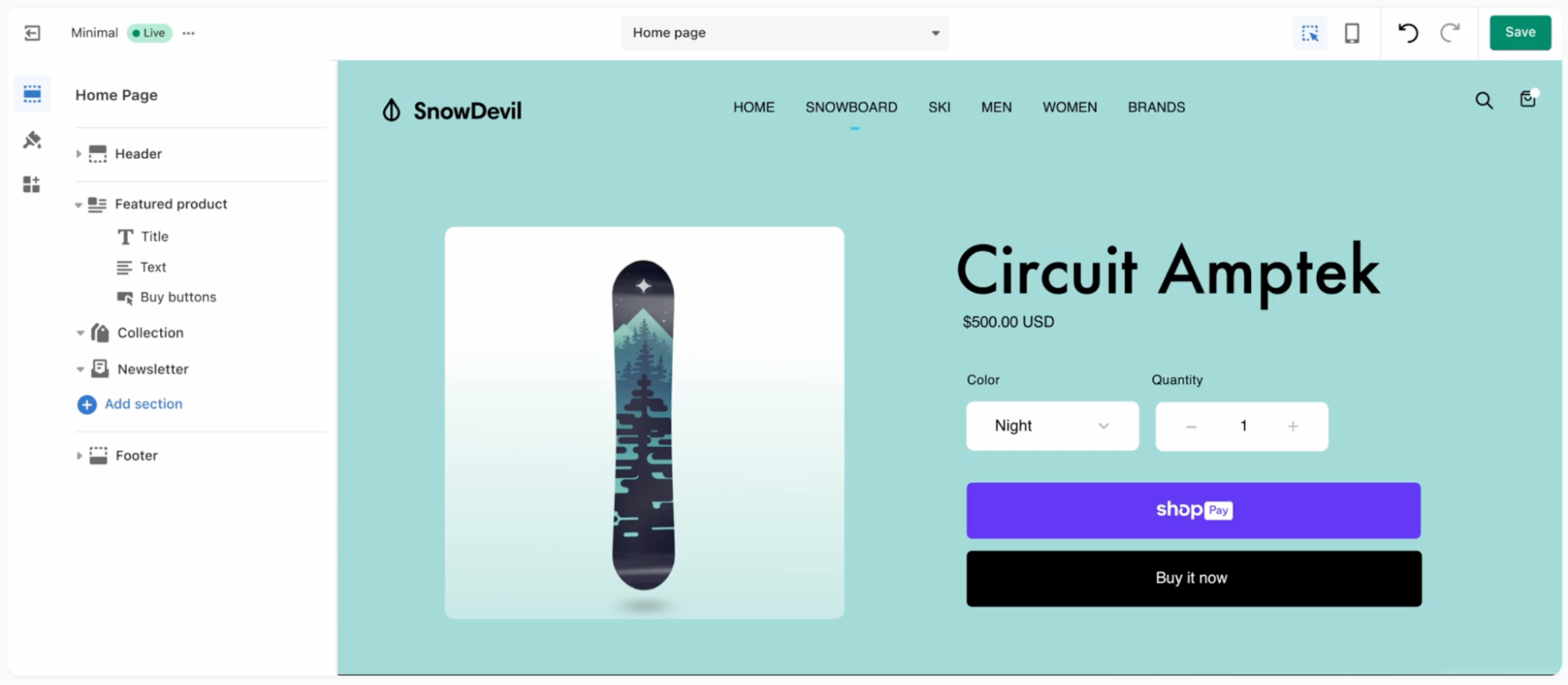
Shopify is the best ecommerce software for most merchants. It combines an intuitive interface with advanced ecommerce features.
Whether selling on a website, social media, marketplace, or offline, Shopify users can manage their business through a single platform.
Shopify's suite of tools and products includes:
- Ecommerce Website Builder
- Hosting Services
- Payment Processing
- Shipping and Order Processing
- Customer Relationship Management (CRM)
- Other various marketing tools and products
- AI Sidekick for Ecommerce, Shopify Magic
Once you’re up and running, take your website to the next level with Shop Pay, the online payment system with the highest conversion rates. Create a better shopping experience with a customizable storefront, cart abandonment recovery, and product subscription features.
As your orders increase, you can use Shopify POS to handle offline sales and Shopify Fulfillment to handle shipping and inventory management.
Need more features? Take advantage of over 8,000 apps to connect and upgrade your site through the Shopify App Store.
With Shopify, you don’t need any technical expertise or money. This ecommerce software includes everything you need to start and grow your business.
Free trial period: 3 days. After that, the first month is $1.
Rate plan:
- Shopify Starter: $5 per month
- Shopify Basic (most popular): $29 per month
- Shopify: $79/month
- Shopify Advanced: $299 per month
Integrated sales channels:
- Walmart Marketplace
- eBay
- Amazon
Mobile App Features: Access to a variety of mobile tools to fully manage your online business.
Point of Sale (POS): Yes.
2. Wix
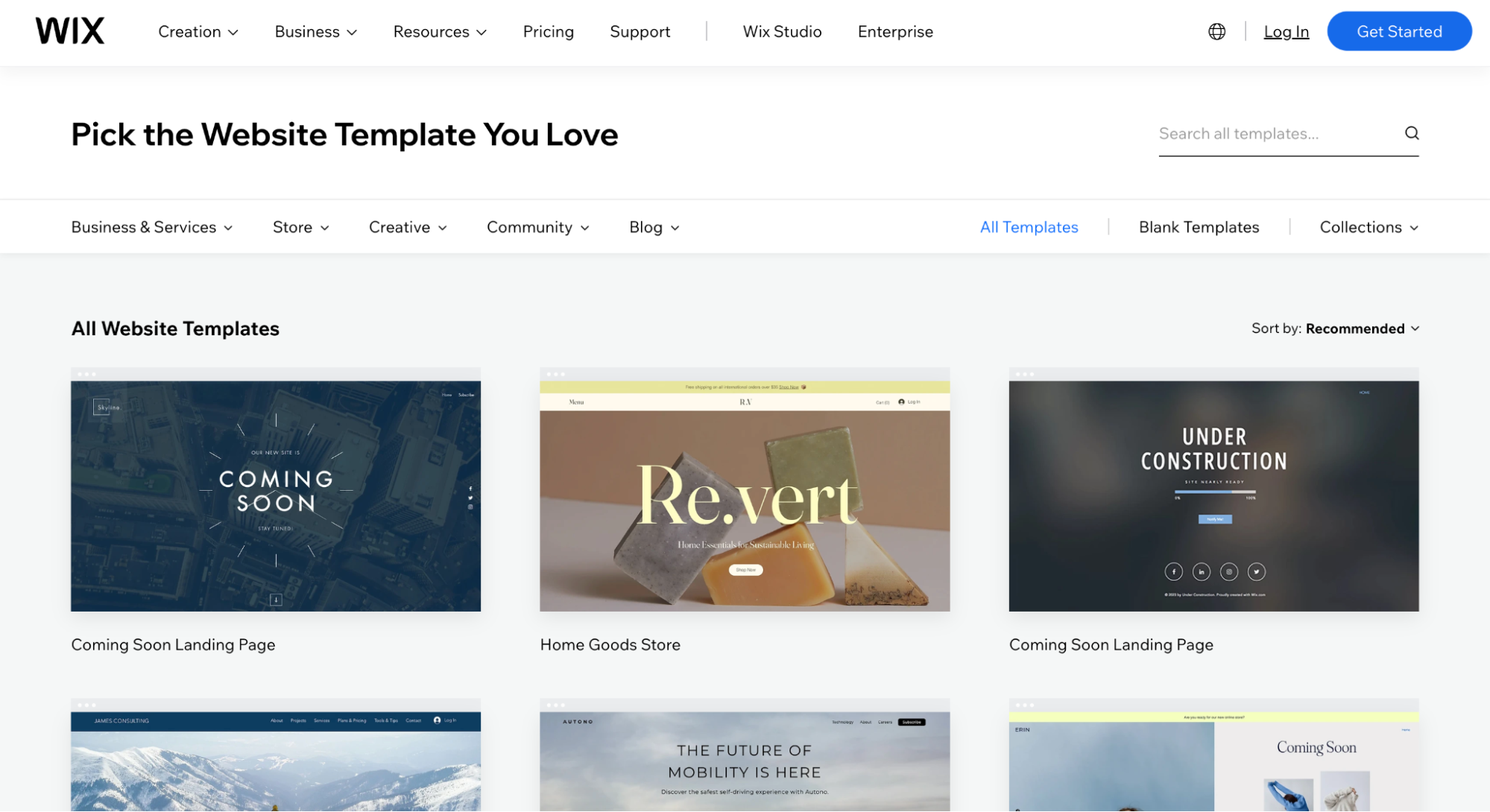
Wix is a website builder with drag-and-drop functionality. If you want to sell products online, you can add ecommerce features to your website. The Wix website builder is free, but you’ll need a paid subscription to remove the Wix branding and take advantage of ecommerce tools. Websites built with Wix can perform basic ecommerce tasks. You can track orders, accept online payments, sell through multiple channels (available on higher-end plans), automate customer emails, and more.
However, Wix lacks some of the more sophisticated ecommerce features that Shopify offers, such as low inventory alerts to prevent stock shortages. If you have a medium to large inventory, the Wix software may be a bit too simplistic for your needs.
Free Trial Period: doesn't exist.
Pricing plans: Free to $159 per month, depending on included features.
Unified Sales Channels: Available on higher-tier plans.
Mobile App Features : Yes.
Point of Sale (POS): Yes.
3.BigCommerce
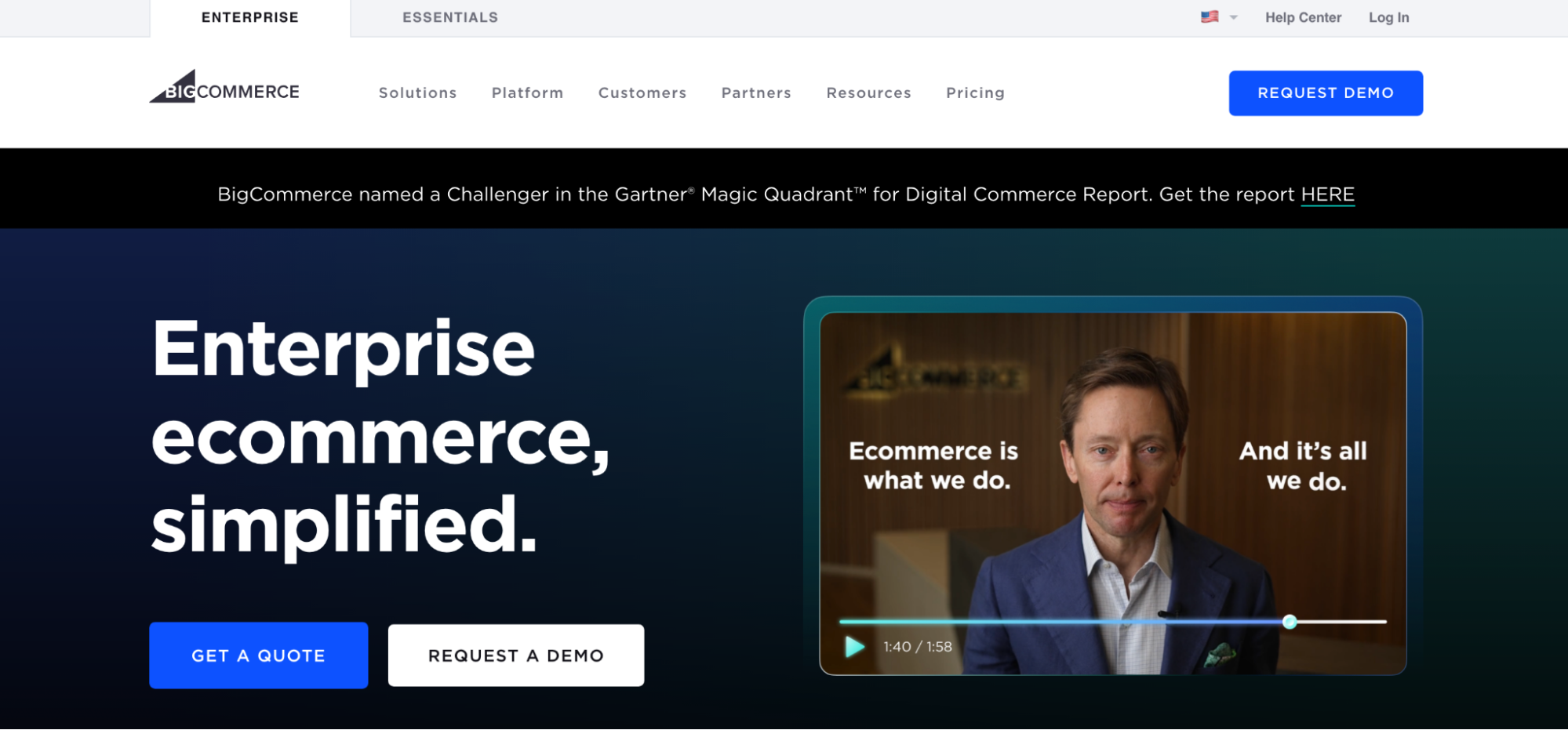
BigCommerce offers enterprise-grade ecommerce software designed for large businesses. The platform is powerful enough to handle retail businesses with high sales and large inventories. BigCommerce supports a wide range of ecommerce features, including cross-border selling, SEO, social selling, and third-party marketplaces. It is also limited in terms of customization. Ecommerce brand Grace & Lace switched from BigCommerce to Shopify Plus to implement upselling and crossselling capabilities, taking advantage of more flexible sales features.
Pricing: $29-$299 per month, depending on features included. Custom pricing applies to enterprise businesses.
Free Trial Period: 15 days.
Integrated sales channels: Yes.
Mobile App Features: Yes.
Point of Sale (POS): Third-party integrations available.
4. Adobe Commerce (formerly Magento)
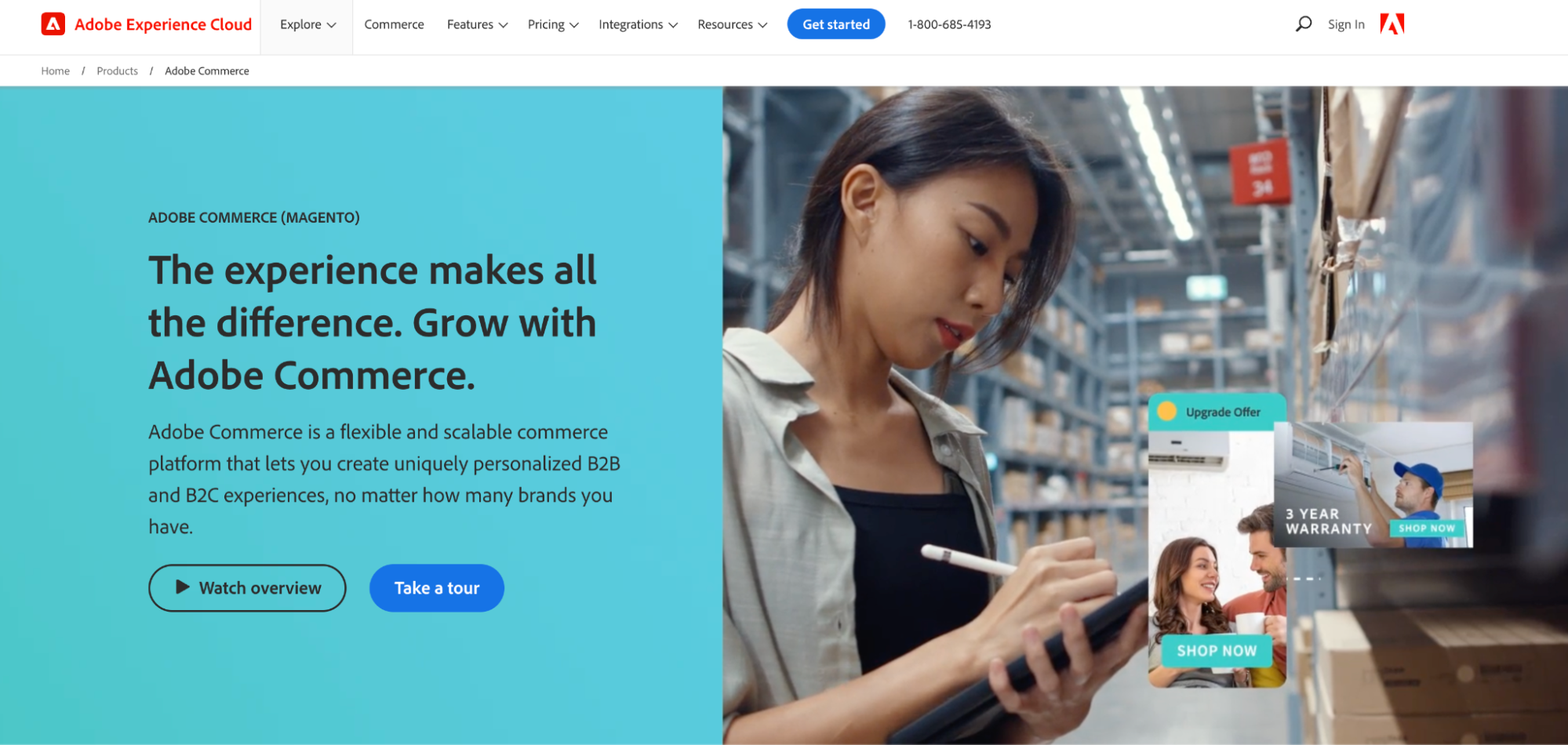
Adobe Commerce (formerly Magento) is an ecommerce platform for established businesses that have the resources to build and maintain an online store. It requires a third-party hosting provider and requires basic technical knowledge. Adobe Commerce may not be the best platform for ecommerce stores that want to sell across multiple channels, as sales channel integration and international payment processing are more complex than the other software on this list.
Free Trial Period: No free trial.
Pricing: Custom pricing only.
Integrated sales channels: Limited.
Mobile app features: None.
Point of Sale (POS): Third-party integrations available.
5. WooCommerce
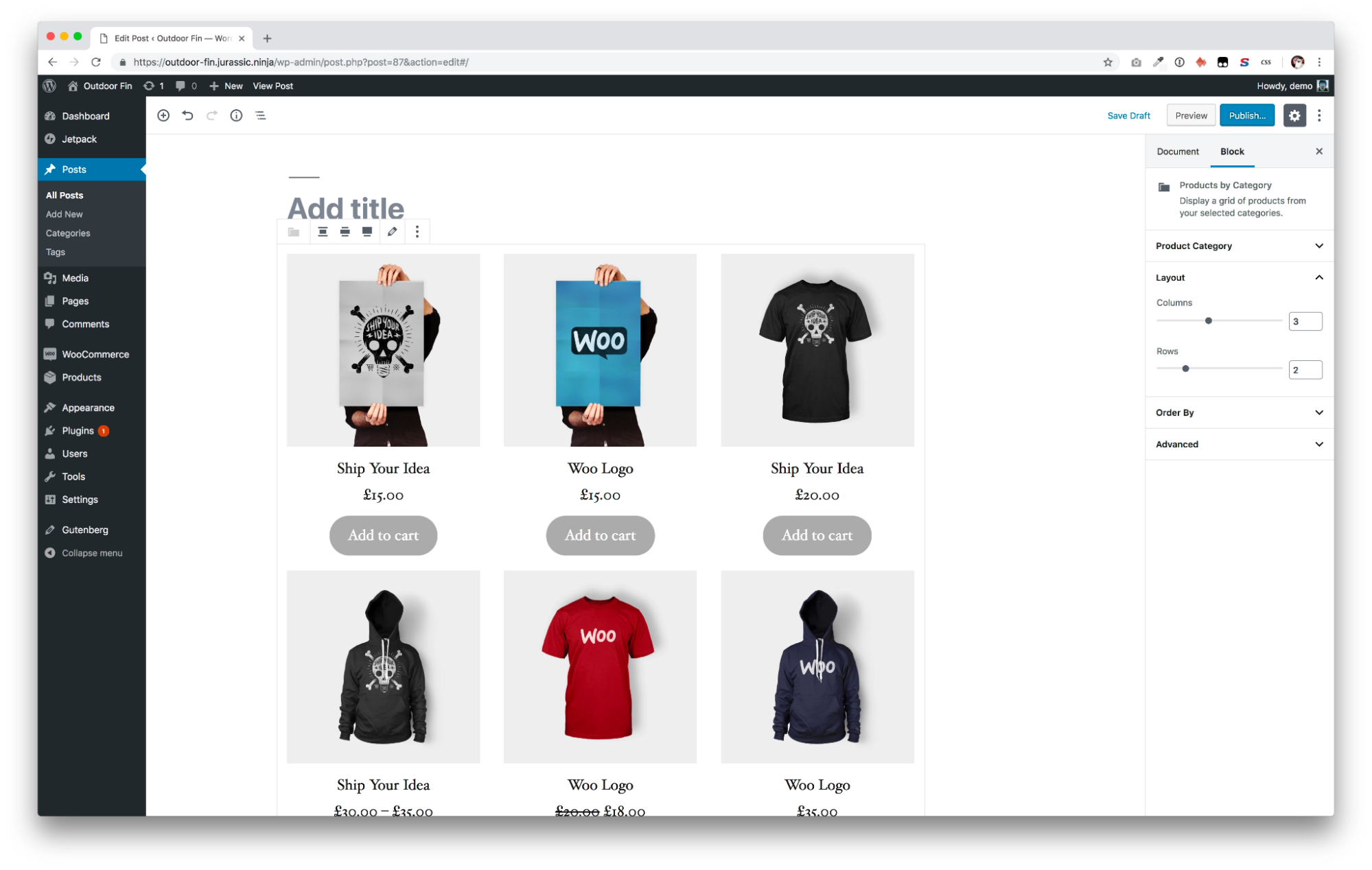
WooCommerce is a free plugin for WordPress that turns your WordPress blog into an e-commerce store with your own brand, products, and payment system.
WooCommerce allows merchants to promote products, accept orders, and track sales. If more complex functionality is needed, additional add-ons can be installed. These add-ons increase the flexibility of the platform, but can also result in a complex backend.
Since WooCommerce doesn’t include features like domain name registration and hosting, you’ll need to pay for these separately, which can make managing your overall costs difficult.
Basic plugin is free. Additional features sold separately.
Integrated sales channels: Yes.
Mobile App Features: Yes.
Point of Sale (POS): Yes.
6. PrestaShop

If you want simple e-commerce features, such as a shopping cart and checkout, you can use the free version of PrestaShop, but you will need to find a separate hosting provider.
The paid version of the platform includes hosting, store installation, and developer support.
7.Squarespace
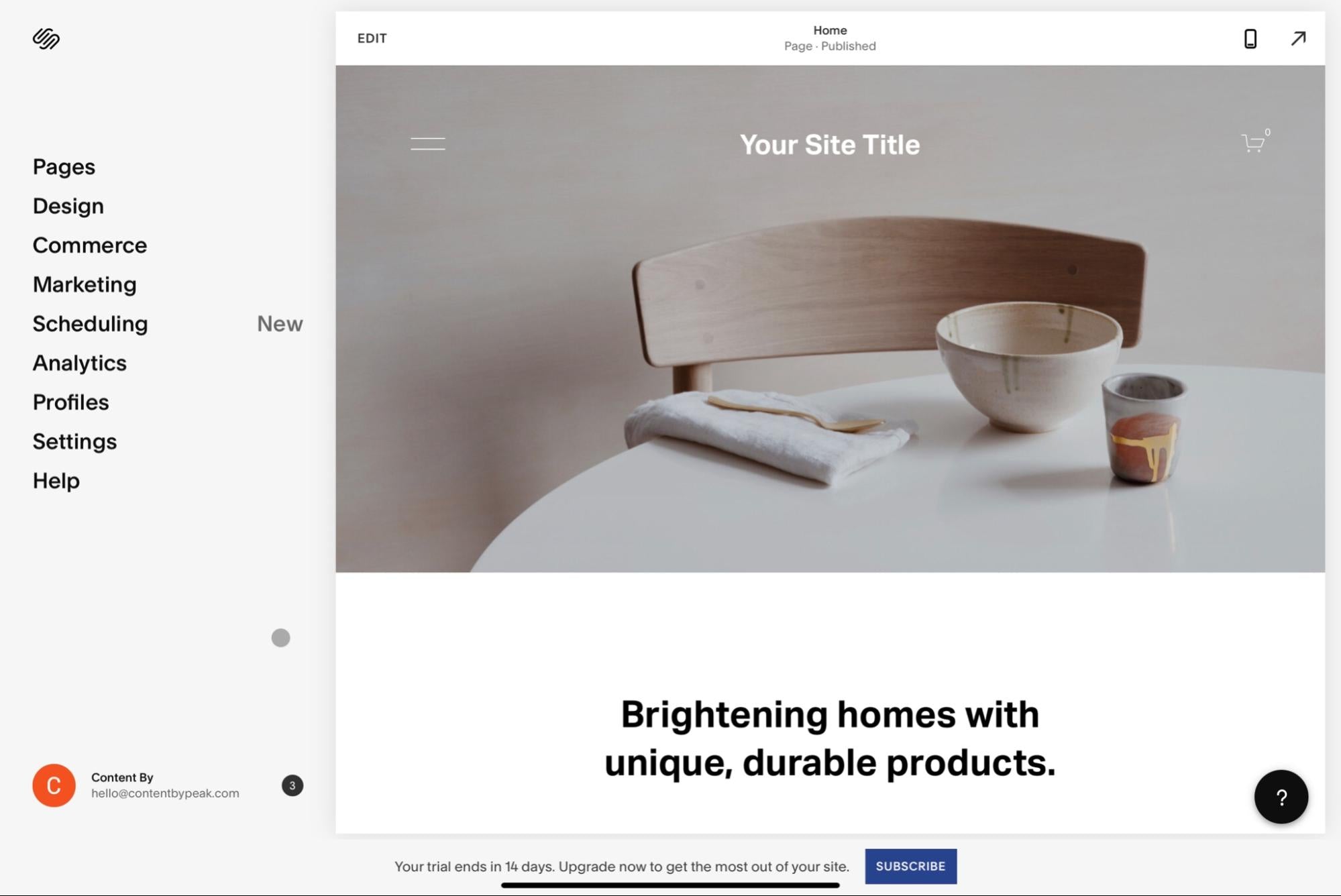
Squarespace, a drag-and-drop site builder, offers a user-friendly interface and ecommerce features.
However, because it is a website creation platform rather than an e-commerce-specific software, it lacks some tools. For example, payment integration only offers two options.
One of the great things about Squarespace is its inventory tracking capabilities. You can also upgrade your plan to sell subscription products.
Free trial period: 14 days.
Plans: $28-$52 per month, depending on included features.
Integrated sales channels: Yes.
Mobile App Features: Yes.
Point of Sale (POS): Yes.
8. GoDaddy
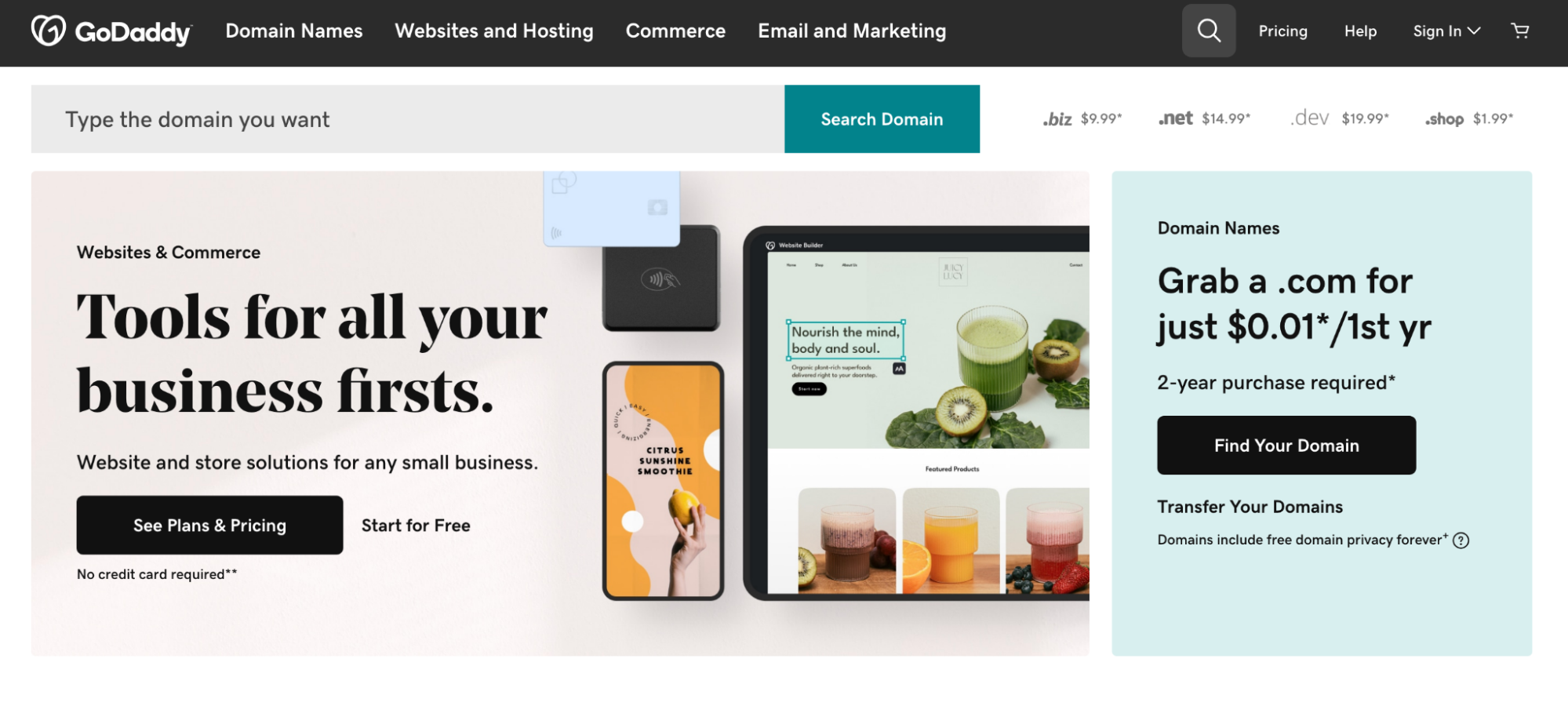
GoDaddy is a well-known domain seller, and also offers an e-commerce website builder that uses artificial intelligence (AI) to quickly design your site and build a customized website based on information you provide.
GoDaddy can help you get started quickly, but there are limits to the number of products you can sell through the platform. So if you’re looking to expand your store, GoDaddy may not be the best ecommerce software for you.
Free trial period: 30 days.
Pricing: $11.99-$20.99 per month, depending on included features.
Integrated sales channels: Yes.
Mobile App Features: Yes.
Point of Sale (POS): Yes.
9. Volusion
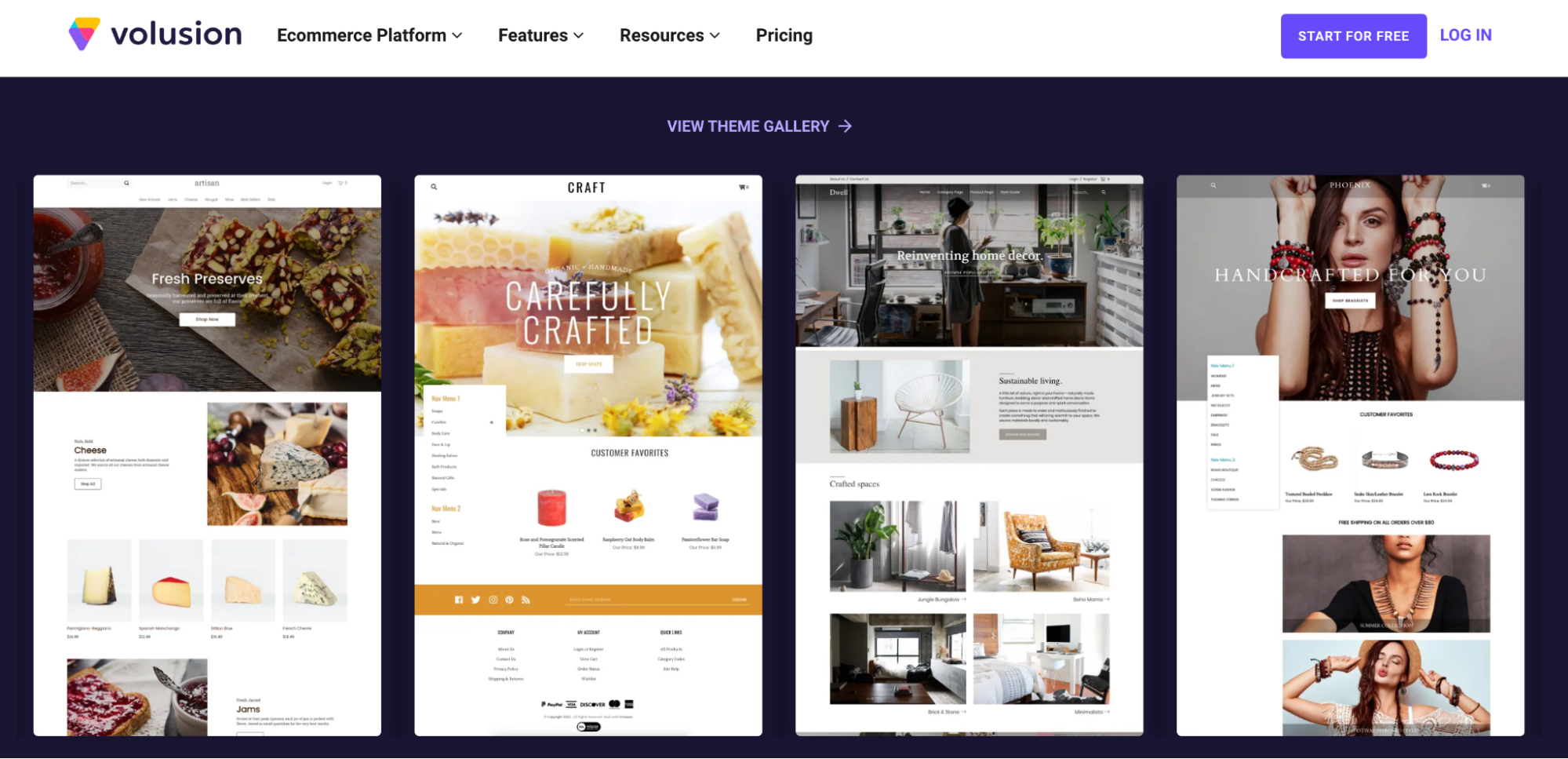
Volusion is another ecommerce software that started out as a basic website builder and expanded its functionality to support online sales. You will need to register and pay for a domain name from a third party, but Volusion includes web hosting in its plans.
Volusion offers basic ecommerce features like order processing, recurring payments, inventory tracking, and related product promotions. You can also create and manage customer accounts and add taxes.
However, customization options are limited when changing site templates. As sellers reach a certain stage of growth, they may want to upgrade to an ecommerce platform that offers more tools.
Free trial period: 14 days.
Pricing: $29-$299 per month, depending on included features.
Unified sales channels: possible through expansion.
Mobile app features: Available via extensions.
Point of Sale (POS): Yes.
10. Amazon

Amazon is best known as a third-party marketplace for promoting and selling products, but it also allows merchants to create branded Amazon storefronts. This allows e-commerce businesses to reach a global audience of millions, but Amazon controls the content and charges a fee for each sale.
Creating an Amazon store is a great way to complement your existing sales channels. It allows you to reach new customers, build brand awareness, and avoid Amazon’s fees and restrictions by directing shoppers to your independent online store.
Free Trial Period: No free trial.
Plan: $39.99 per month plus additional referral fee.
Unified sales channels: Integrate your Shopify store with Amazon.
Mobile App Features: Yes.
Point of Sale (POS): None.
11. Shift4Shop
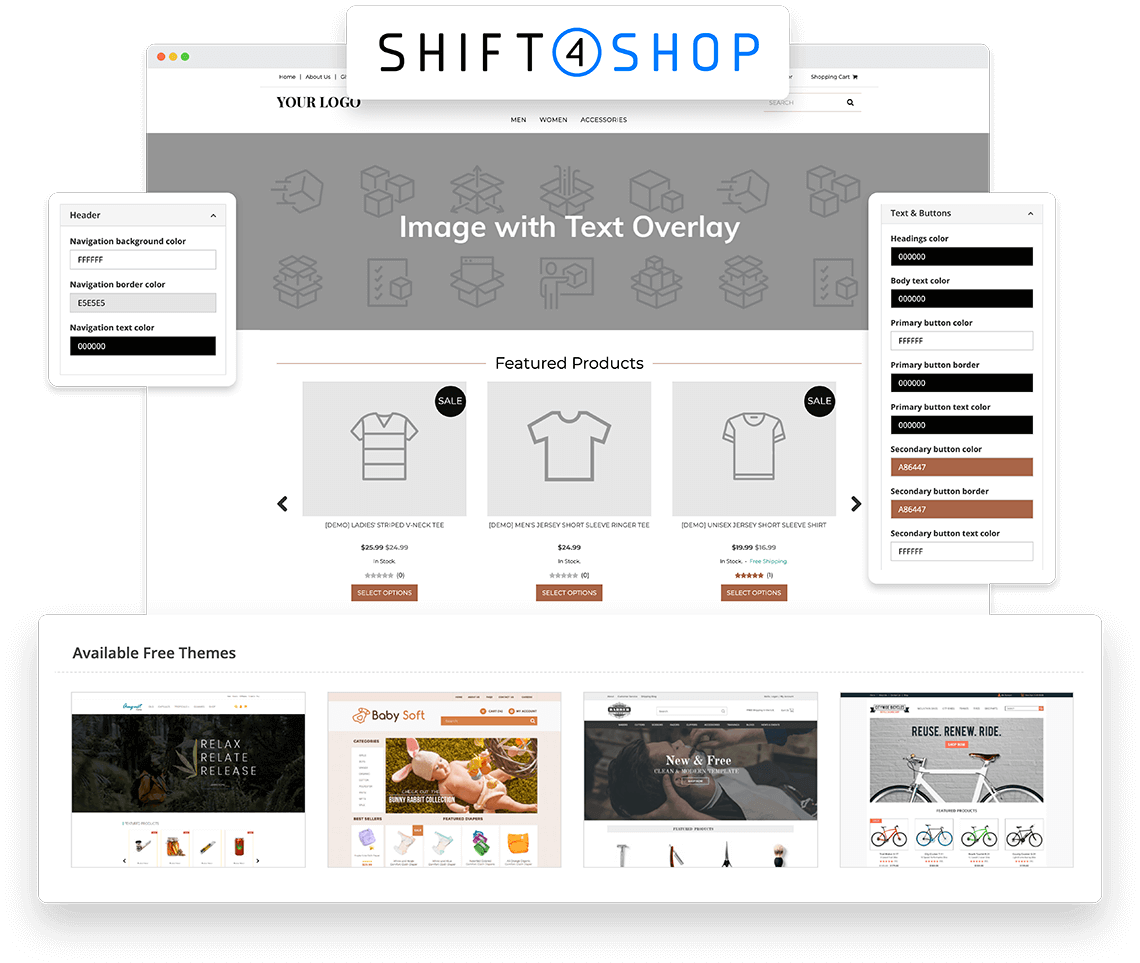
Shift4Shop, formerly known as 3dcart, offers free ecommerce software to businesses that process at least $500 per month through Shift4Shop’s payment tools. Merchants who make less or prefer PayPal payment processing will pay $29 per month.
Shift4Shop doesn’t offer extensive ecommerce features, but it does offer a variety of website templates to help you quickly set up your online store. You can also use the API to integrate your store with third-party apps.
Pricing: Free for businesses processing at least $500 per month with Shift4 payment processing, $29 per month with PayPal payment processing.
Integrated sales channels: Yes.
Mobile App Features: Yes.
Point of Sale (POS): Third-party integrations available. Free for businesses processing at least $500 per month with Shift4 Payment Processing, $29 per month with PayPal Payment Processing.
Integrated sales channels: Yes.
Mobile App Features: Yes.
Point of Sale (POS): Third-party integrations available.
Features you'll find in our eCommerce solutions
Rate Plan
You can start an online business with little to no cost using ecommerce software, but as your sales increase, you start marketing, and you need more complex features, your costs will increase.
According to Shopify analytics, most small businesses spend around $40,000 in their first year, with 9% of that being allocated to online business needs.
Shopify merchants spend an average of $38,000, while non-Shopify merchants spend about $41,000.
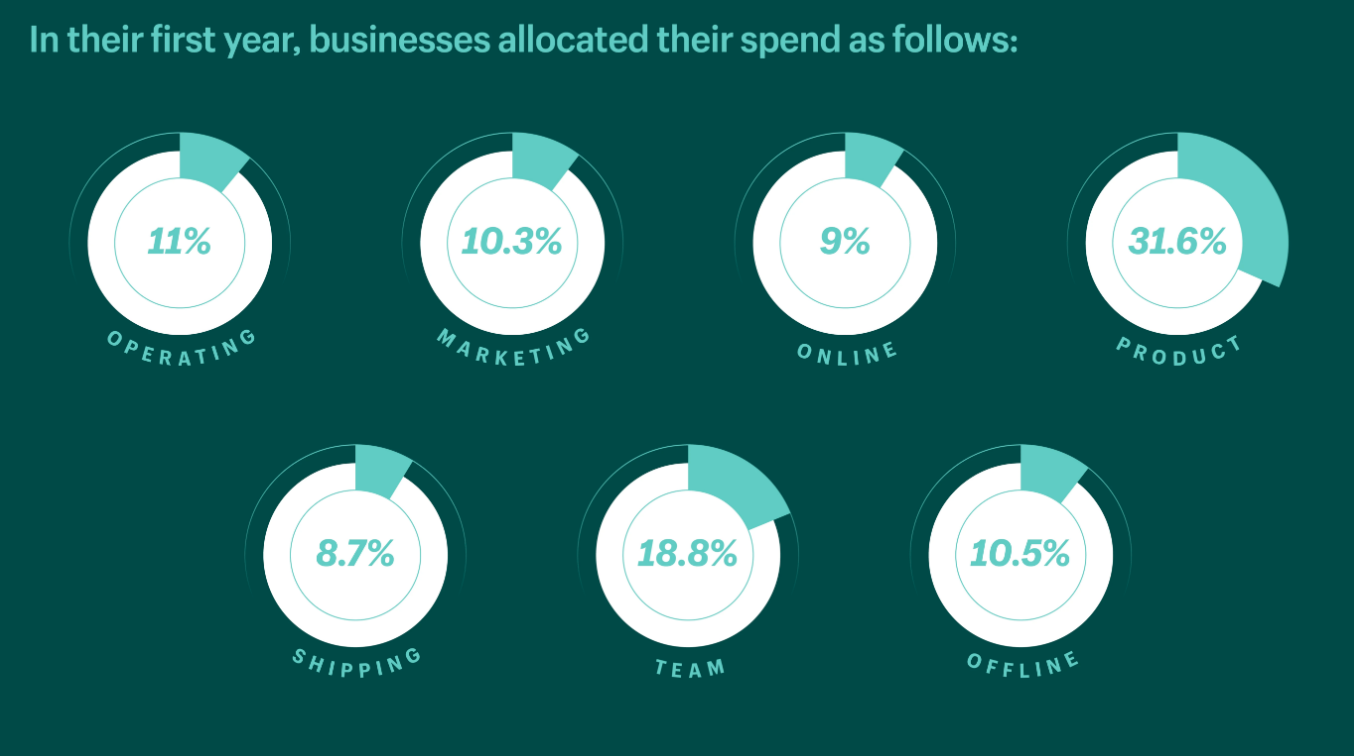
Since it takes time to generate a return on your business investment, it is important to choose an ecommerce software that has all the tools to help you grow your business without draining your entire budget. Consider the monthly fees you will need to pay and the payment gateway fees for each transaction.
The cheapest ecommerce software may seem appealing, but there are other things to consider. Rather than focusing solely on the current state of your business, it is important to look for ecommerce software that is scalable with future operations in mind.
Scalability and usability
Most importantly, your ecommerce software needs to be up to date with your technology.
If you are a programmer, you may want to look for open source e-commerce software for maximum control over your website, but for most people, an accessible interface is essential.
Book a demo or start a free trial to make sure the learning curve isn't too steep.
It's also important to consider how ecommerce software can integrate with more complex elements of your business, such as inventory management or accounting.
When choosing ecommerce software, look for well-reviewed business management tools in addition to store building features. This will help you avoid migration issues that may arise as your business grows.
For example, if you plan to expand into offline retail, you’ll need ecommerce software with add-ons, plugins, and integrations that provide offline selling capabilities. Consider something like Shopify POS, for example.
💡 Shopify POS instantly syncs your inventory and sales data so you’re always up to date.
Simplify checkout
The checkout process can make a real difference in your conversion rate. One of your main priorities as an ecommerce business owner is to provide an easy and secure checkout experience for your shoppers to complete their purchase.
Payment features include familiar payment options like Google Wallet and PayPal, as well as the ability to collect customer information for future use.
If you use Shopify, Shop Pay will speed up your checkout by 4x. Plus, you can take advantage of Shopify’s integrations that support a wide range of payment methods and currencies through 100+ payment gateways.
Customizing
Most ecommerce stores share common features like product detail pages and shopping carts. However, if you want more advanced features and a unique design, look for ecommerce software that offers customization options.
Look for a platform that offers a variety of themes and templates, but also allows for deeper customization. This may include changing colors, fonts, layouts, or adding custom code for more advanced changes.
For example, Shopify offers customizable themes for professionally designed branded storefronts. Store owners with developer skills can create their own templates using Liquid, an open-source templating language. If you need total control, you can separate your store’s frontend from Shopify’s ecommerce software.
Integration with other tools
If your ecommerce software doesn’t easily connect to other services, your business is limited to the software’s basic features and channels. This may be fine in the beginning, but as your business grows, you’ll likely need to leverage third-party tools.
For example, you may need to connect your store to a marketplace like Amazon or eBay to sync your sales and inventory. Or, you may want to add an AI-powered chatbot that can answer shoppers’ questions in real time as they navigate your site.
Most popular ecommerce software have app stores to facilitate these interactions, where developers can build and sell official integrations. For example, Shopify has over 8,000 apps integrated in the App Store, making it easy to connect your store with major tools.
Search Engine Optimization Features
Search Engine Optimization (SEO) helps drive organic traffic to your website. When your online store is optimized for search engines, it appears more often on search engine results pages, increasing visibility and traffic.
Beyond keywords and metadata, search engines also consider the relevance of a website’s subject matter to its expertise. Google’s algorithms check other sites that link to a webpage to assess the authority of the content.
To help you optimize your content, choose ecommerce software that offers SEO features like metadata manipulation, increased page load speed, and image compression.
For example, Shopify's ecommerce software natively supports Google's WebP image format, which makes images load 30% faster.
Web hosting
Web hosting is a fundamental element of website development. A host stores the information and content of a website in a publicly accessible server database. All websites are hosted on the servers of a web hosting provider. Some e-commerce software offers built-in web hosting, while others may require an external hosting solution.
If you use ecommerce software on a hosting platform, the solution is simple. You don’t have to look for a third-party solution or pay extra fees. For example, Shopify includes free web hosting on all plans.
Multi-channel selling
The lines between offline and digital commerce are becoming increasingly blurred. Even small stores are now adopting a multi-channel approach. You need ecommerce software that can sell across multiple channels, including social media, your website, and your brick-and-mortar store, and it’s important that you’re not limited to a specific channel.
Shopify acts as your business’ command center, syncing your online and offline sales data in real time. You can sell and promote across multiple channels within Shopify, including third-party marketplaces like Amazon and wholesale channels.
Customer Support
No matter what ecommerce software you use, there will be times when you need to troubleshoot issues or add new features to your online store. That’s why it’s a good idea to choose ecommerce software that offers customer support.
Look for a provider that offers support through multiple channels (phone, email, live chat, etc.). Also consider the quality of support, such as knowledge bases and tutorials. Active community forums can be a great source of useful information.
Why Your Online Store Needs Ecommerce Software
Ecommerce software is the foundational element of any online store. It acts as the engine that runs your business, allowing you to manage your products, accept payments, track orders, and more.
Here’s why you need ecommerce software for your online store:
Easy store setup
Most store owners aren't interested in using code to program their ecommerce websites.
The ecommerce platform provides a way to create and maintain an online store without coding. Thanks to the intuitive interface and drag-and-drop functionality, you can design your store, add products, and set up payment options with just basic computer skills.
This means you can quickly get your ecommerce store up and running on your own without any additional help.
Payment Processing Process
Ecommerce software developers invest millions of dollars to ensure high conversion rates. These payment processors increase the likelihood that customers will successfully complete their checkout and reduce the likelihood that they will abandon their shopping carts.
Payment processors in ecommerce software offer a variety of payment options and keep customer information safe, which is a benefit that increases your brand’s credibility when selling online.
Order Management
Managing orders effectively is critical to maintaining customer satisfaction.
Ecommerce software helps you track an order from the moment it is received until it is shipped, providing updates to your customers along the way.
Automated order management features also make it easier to check inventory levels and process returns.
Optimizing Customer Experience
Building your online store using ecommerce software also makes it easier to provide a satisfying browsing experience.
The combination of a professionally designed theme and a well-designed backend creates a store that's easy to navigate, has fast loading times, and a smooth checkout process—whether on desktop or mobile.
In addition to enhancing the shopping experience, a premium-feeling website adds professionalism and quality to your brand.
Analysis and Reporting
Understanding your customers' behavior helps you grow your store more effectively.
Most ecommerce software offers built-in analytics and reporting tools that provide insights into customer shopping habits, popular products, sales trends, and more.
Security and Compliance
In the world of e-commerce, security is a top priority. Customers need to feel that their personal information is safe when shopping on your website.
Popular ecommerce software offers an easy way to comply with the latest security standards and regulations, such as the Payment Card Industry Data Security Standard (PCI DSS).
Building a global customer base
In a brick-and-mortar store, reach is largely determined by location. By moving online using ecommerce software, you can sell your products globally and operate 24 hours a day.
Most ecommerce software offers features to enhance international selling, including multilingual support, currency conversion, and international shipping support.
Start selling online with Shopify
When choosing ecommerce software, don't forget to consider your current and future needs.
The right ecommerce software is more than just a store-building tool. It should provide features that support your business both now and as it grows.
Ecommerce Software FAQs
What is the best ecommerce software?
Shopify is the best ecommerce software. Shopify offers a variety of tools to help you manage your online business, streamline your checkout, and provides the flexibility to scale as you grow, along with 24/7 customer support.
What are the main types of eCommerce software?
There are three main types of ecommerce software. First, software as a service (SaaS) is a subscription-based model where the software is hosted on third-party servers and accessed over the Internet. Second, platform as a service (PaaS) provides an environment for developers to build apps and services over the Internet. Third, on-premise platforms are installed and run on the company’s own servers.
How does ecommerce software work?
Ecommerce software connects all your online systems on the backend, allowing you to promote your website, sell products, and fulfill orders.
How do I build an ecommerce website?
Choose one of the ecommerce software listed in this article, sign up for an account, and design your ecommerce website. Customize the look and feel of your site, add products, and set up backend processes for checkout and order fulfillment.
